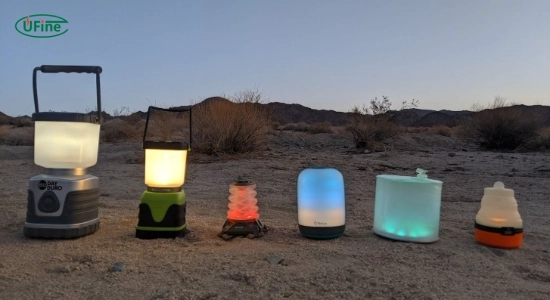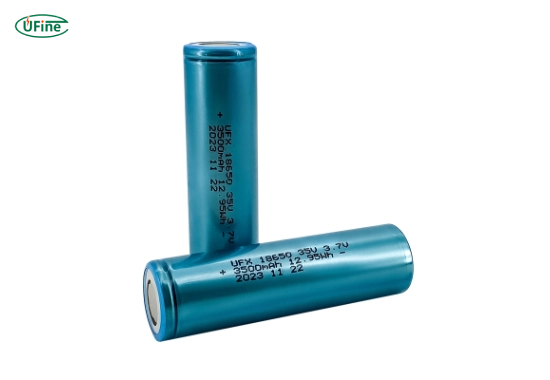
- Part 1. What is a battery for a lantern in backpacking?
- Part 2. Why weight matters so much for backpackers
- Part 3. Types of lantern batteries explained
- Part 4. Lightweight battery options for lanterns
- Part 5. How to choose the right battery for your lantern?
- Part 6. Best lanterns that use lightweight batteries
- Part 7. Tips to extend battery life on the trail
- Part 8. Solar charging vs. power banks: Which is better?
- Part 9. Mistakes to avoid when choosing batteries for your lantern
- Part 10. Alternatives to traditional lanterns
- Part 11. FAQs about the battery for lantern
Backpackers often ask, “What is the best battery for a lantern that is both lightweight and powerful?” The best battery for lanterns used in backpacking should be light, long-lasting, and rechargeable. It should offer a smart balance between weight and power to keep your pack light without sacrificing performance.
In this guide, we’ll explore the best options, how to choose them, and what to look for—all in a friendly, easy-to-understand manner.
Part 1. What is a battery for a lantern in backpacking?
A lantern battery is the power source that keeps your camp light shining after the sun goes down. In backpacking, it can be disposable or rechargeable, and it powers small lanterns used to light up your tent, campsite, or trail.
These batteries must be lightweight, since every gram counts when you’re hiking long distances. But they also need to be powerful enough to last through multiple nights.
Part 2. Why weight matters so much for backpackers
When you’re carrying all your gear on your back, weight is everything. Even an extra 100 grams can feel like a burden after a few miles.
That’s why backpackers always search for the lightest gear possible, including lanterns and batteries. A heavy battery might last longer, but it can slow you down and tire you out faster.
So, the key is to find a battery that offers enough power without weighing you down.
Part 3. Types of lantern batteries explained
There are several types of batteries used in backpacking lanterns. Here’s a quick breakdown:
1. Alkaline batteries
- Common (AA, AAA)
- Cheap and easy to find
- Heavier than lithium
- Not rechargeable
2. Lithium batteries
- Much lighter than alkaline
- Long shelf life
- Better performance in cold weather
- More expensive
3. Rechargeable batteries (NiMH or Li-ion)
- Eco-friendly
- Can be used many times
- Needs a charger or solar panel
- Can save money in the long run
4. Built-in rechargeable battery packs
- Found in USB-powered lanterns
- Lightweight and modern
- Easy to charge with a power bank or solar panel
- No need to carry extra batteries
Part 4. Lightweight battery options for lanterns
Here are some top options for ultralight backpackers:
Eneloop NiMH AA rechargeable batteries
- Popular among hikers
- Weighs around 27g per battery
- Rechargeable up to 2,100 times
- Great for multi-day trips
Energizer Ultimate Lithium AA
- One of the lightest and longest-lasting AA batteries
- Weighs about 15g per battery
- Works well in extreme temperatures
- Not rechargeable, but excellent for ultralight trips
Goal Zero Guide 12 + Nomad Solar Panel
- A combo of the rechargeable battery pack and solar power
- Slightly heavier setup, but great for long trips
- Sustainable and off-grid friendly
Ufine 18650 Li-ion battery 3500mAh
- High-capacity lithium-ion battery ideal for compact lanterns
- Weighs about 48g per cell
- Rechargeable and compatible with many USB-powered devices
- Reliable for overnight hikes or extended outdoor use
Part 5. How to choose the right battery for your lantern?
Here are a few key things to consider:
- Trip length
Short trips (1-2 nights): Disposable lithium can be perfect
Extended trips (multi-day or thru-hikes): Go with rechargeable + solar - Lantern type
Does it use AA/AAA batteries, or does it have a built-in USB battery?
Match the battery type to your lantern model - Weight
Every gram counts!
Choose lithium or USB-powered lanterns for the best weight-to-power ratio - Reusability and cost
Rechargeable batteries cost more upfront
But they save money and waste over time
Part 6. Best lanterns that use lightweight batteries
Here are some backpacker-approved lanterns that pair well with lightweight batteries:
1. Black Diamond Moji Lantern
- Uses AAA batteries
- Compact and lightweight
- Compatible with Energizer lithium AAA
2. LuminAid PackLite
- Solar-powered and USB rechargeable
- Super light and collapsible
- No need for extra batteries
3. Nitecore LR60
- Runs on 18650 rechargeable Li-ion
- Can also charge your phone
- Ideal for tech-savvy hikers
Part 7. Tips to extend battery life on the trail
To make the most out of your battery for a lantern, try these tips:
- Dim the light when full brightness isn’t needed
- Turn off the lantern when not in use
- Use reflective surfaces (like a white tent wall) to spread light
- Choose lanterns with efficient LED bulbs
- Store batteries in a warm place (like your sleeping bag) in cold weather
Part 8. Solar charging vs. power banks: Which is better?
When using rechargeable lanterns, you’ll need a way to recharge them on the go.
Solar chargers
- Great for long trips with lots of sun
- Eco-friendly and quiet
- May be slow or useless on cloudy days
Power banks
- Convenient and fast
- Can charge multiple devices
- Heavier than solar panels
Best combo: Bring a small solar charger and a light power bank for flexibility.
Part 9. Mistakes to avoid when choosing batteries for your lantern
- Choosing the wrong size: Always check what kind of battery your lantern needs
- Bringing too many batteries: Plan your power needs carefully
- Ignoring cold weather effects: Batteries drain faster in cold conditions
- Not testing before your trip: Always check your setup at home first
Part 10. Alternatives to traditional lanterns
Backpackers sometimes skip lanterns altogether. Here are a few minimalist lighting options:
- Headlamps with red light: Lightweight and battery-efficient
- Glow sticks: No batteries, but not reusable
- Tea light candles: Risky but ultralight (not recommended in dry areas)
These can be backup options, but a battery-powered lantern remains the safest and most reliable source of camp lighting.
Part 11. FAQs about the battery for lantern
What is the lightest battery for lanterns?
Lithium AA or AAA batteries, like the Energizer Ultimate Lithium, are among the lightest and most powerful options for backpackers.
Are rechargeable batteries better for backpacking lanterns?
Yes, especially for long trips. They’re eco-friendly, cost-effective, and can be recharged with solar panels or power banks.
How long do lantern batteries last on a backpacking trip?
It depends on the battery type and lantern. Most lithium AA batteries can power a small LED lantern for 20-60 hours on a low setting.
Can I use the same batteries for my headlamp and lantern?
Yes, if both use the same size (like AA or AAA). This saves weight and simplifies packing.
Is it safe to bring lithium batteries on a plane?
Yes, but check airline rules. Usually, spare lithium batteries should be in carry-on luggage, not checked bags.
Related Tags:
More Articles

What are Watts and Watt Hours in Battery?
Understand watt vs watt-hour in batteries, how to calculate battery watt hours, and what Wh means for car batteries, devices, and energy storage.
A Complete Guide to the Best Batteries for Flashlights
Compare the best batteries for flashlights, including AA, AAA, 18650, 21700, CR123A. See which battery offers the best brightness, runtime, and reliability.
How Long Do Rechargeable AA Batteries Last?
How long do rechargeable AA batteries last? Compare NiMH and lithium AA lifespan, recharge cycles, key factors, and performance vs alkaline batteries.
How Much Current Can a 9V Battery Really Supply?
Discover how many amps a 9V battery can supply, its actual current output, discharge rate, and capacity for alkaline, lithium, and rechargeable 9V batteries.
12V STD vs 12V AGM: Meaning, Differences, and Which Is Better
Understand what STD and AGM batteries mean, their key differences, and which 12V battery fits your needs best in 2026.




